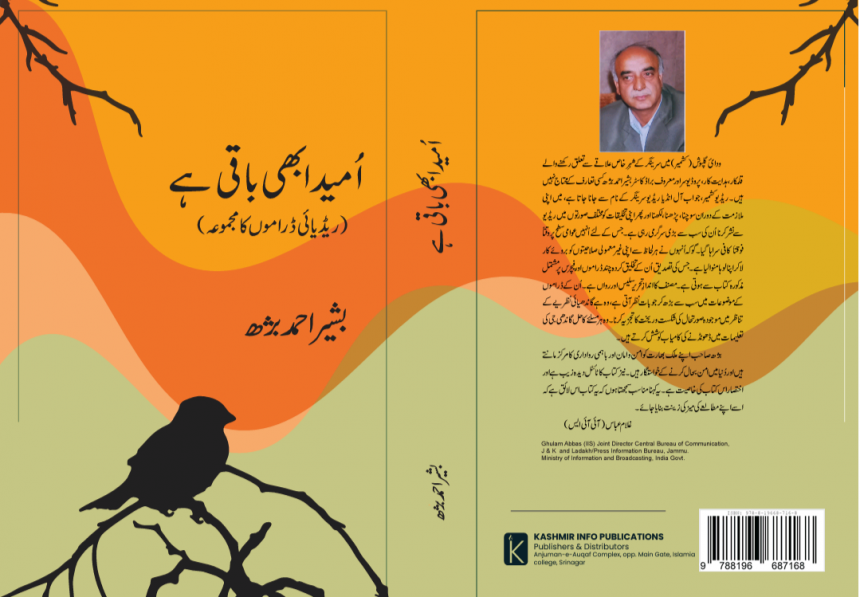“Umeed Abhi Baaqi Hai”—the title alone holds within it an indelible sense of resilience and defiance, a lingering belief in hope even amidst despair. This collection of radio dramas by Bashir Ahmad Buch isn’t merely an anthology; it’s an eloquent echo, an anthem to the undying spirit of humanity and a testament to the enduring power of storytelling. Written in the poetic and deeply expressive language of Urdu, each story within Umeed Abhi Baaqi Hai serves as a bridge between tradition and contemporary societal values, invoking the time when radio dramas acted as the conscience of society, as messengers of morality, unity, and compassion. Comprising twelve thoughtfully curated radio dramas broadcast from Srinagar’s All India Radio station, this 242-page masterpiece invites readers into an era when radio dramas served as the conscience of society, as messengers of values, and as keepers of the collective spirit.
Buch’s work is imbued with a profound understanding of human nature, and he employs his artistry not just as a writer but as an architect of sound and silence. Each story is not merely written but composed, as though the words themselves are musical notes, each one contributing to the symphony of human experience. Through simple yet evocative language, he invites readers into a world that is simultaneously Kashmiri in its essence and universal in its appeal. In his hands, the Urdu language transcends its role as a mere vehicle for communication; it becomes a medium that conveys unspoken truths, shared joys, collective grief, and enduring hope.
The literary beauty of Buch’s work lies in its simplicity—he uses accessible language, yet each line resonates with layers of meaning, like a river that appears tranquil on the surface but conceals powerful undercurrents beneath. His prose flows with a quiet grace, mirroring the rhythms of Kashmiri life, its silences as potent as its words. In a genre where verbosity often risks overshadowing substance, Buch’s restraint allows his narratives to breathe, his characters to linger in the reader’s mind long after the final page is turned. Each dialogue, each pause, is purposeful, creating an experience that transcends mere reading; it becomes a journey into the heart of Kashmir’s cultural and social landscapes.
The book’s themes are woven like threads in a tapestry, each one distinct yet part of a unified whole. Umeed Abhi Baaqi Hai addresses issues that are timeless and urgent: nationalism, communal harmony, environmental preservation, gender sensitivity, and social justice. Through these narratives, Buch doesn’t just tell stories; he opens a dialogue with his readers, prompting introspection and empathy. The narratives are anchored in the lived realities of Kashmir but resonate far beyond its geographical boundaries, speaking to anyone who has known struggle, injustice, or the transformative power of hope.
One of the standout pieces in the collection is Dard Ka Ehsas (The Feel of Pain), a story that won the Akashvani Annual Award in 2008. In this tale, we meet an innocent man wrongfully accused, who must endure the agony of societal rejection and personal suffering. Buch handles his character with a delicate hand, refusing to cast him as a victim or a hero. Instead, he is a man—a flawed, wounded soul who embodies the dignity that comes not from innocence alone but from resilience. Through him, Buch explores the devastating impact of wrongful accusations, the emotional toll of isolation, and the quiet strength that emerges when one’s truth is unshakable. Dard Ka Ehsas is more than a story; it is a reflection on humanity’s capacity for both cruelty and compassion, leaving readers haunted by its melancholic beauty.
Another powerful narrative, Sher Dil Insaan (The Braveheart), introduces us to a retired soldier who becomes a source of hope and guidance for young men at risk of falling into violence and extremism. This character’s courage transcends the battlefield, embodying an inner resilience that speaks to Buch’s understanding of true bravery. In an age where strength is often equated with physical prowess or military might, Sher Dil Insaan reminds us of the power of quiet courage, the kind that rebuilds communities, families, and hearts even in the face of destruction. The retired soldier is not just a character; he is a symbol of the resilience that has sustained Kashmir through centuries of strife, an embodiment of the belief that hope persists, no matter how bleak the circumstances.
Buch’s compassion extends to all his characters, refusing to simplify them as mere heroes or villains. His women, in particular, are beautifully complex, reflecting strength, vulnerability, and the delicate balance between tradition and rebellion. In Lafzon Ka Safar (The Journey of Words), he portrays women who rise above societal prejudice, their resilience not born of anger alone but of quiet dignity, compassion, and an indomitable spirit. These women are multifaceted; they are survivors, rebels, nurturers, and custodians of culture, embodying the grace and strength that define Kashmiri womanhood. Buch’s depiction of these characters is deeply respectful, treating them not as symbols or archetypes but as individuals whose journeys resonate with universal themes of struggle and triumph.
In his portrayal of social issues, Buch’s narratives are subtle yet powerful. He addresses themes such as women’s empowerment, child marriage, and environmental conservation not as mere plot points but as living, breathing concerns embedded in the fabric of his characters’ lives. Fitrat Se Qurbat (Close to Nature), for example, explores environmental consciousness through a story that flows as naturally as a river through a parched landscape. In this piece, Buch addresses ecological themes with a gentleness that speaks louder than words, encouraging readers to reconsider their relationship with the natural world. His storytelling here is both a tribute to the beauty of nature and a quiet yet urgent call to action, reminding us of our duty to protect the planet.
Buch’s mastery of language extends to the structure of his narratives as well. Each story is crafted with an elegance that only an artisan of his caliber could achieve. His sentences, though seemingly simple, carry an artistry that mirrors the rhythms of Urdu poetry, each word chosen with precision and purpose. There is a musicality in his prose, a cadence that is almost hypnotic, inviting readers into a shared moment of imagination and introspection. In an era of fleeting visuals and rapid communication, Umeed Abhi Baaqi Hai serves as a reminder of the intimacy and depth that only auditory storytelling can offer.
The collection is not only a literary achievement but also a nostalgic tribute to the golden era of radio drama. Radio dramas, once a cherished form of entertainment and enlightenment, have largely faded into obscurity in the digital age. Yet, through this collection, Buch rekindles that magic, preserving the intimacy of spoken word storytelling and the profound impact it can have on the soul. His dramas transport readers into worlds crafted solely through words and sounds, echoing a time when imagination was the only visual aid, and each listener became a co-creator of the story.
Buch’s laurels, including awards such as the Laadli Media Award for works like Lafzon Ka Safar and Beti Aayi Khushiyan Laayi (Daughter Brings Happiness), stand as testaments to his skill and dedication. These accolades are not mere symbols of recognition; they are endorsements of his commitment to using drama as a catalyst for social change. His stories shine a light into the darker corners of society, urging readers to reflect, to feel, and to take responsibility. Through his characters, Buch does not preach; he merely reflects humanity in all its shades, inviting readers to find the courage, compassion, and hope within themselves.
Umeed Abhi Baaqi Hai is a profound declaration that hope remains resilient in a world often overshadowed by despair. Buch’s stories are whispers of kindness, resilience, and love, each one urging us to believe in the possibility of a world united by understanding and empathy. Through his work, Buch invites readers not only to witness his vision but to become part of it, to embody the ideals he so beautifully portrays. His hope is not a mere abstraction but a tangible call to action, a reminder that each of us has a role in building a more compassionate world.
For anyone who cherishes Urdu literature or seeks narratives that transcend mere entertainment, Umeed Abhi Baaqi Hai is essential. It is a collection that leaves readers not only enriched and inspired but also filled with a renewed sense of purpose, a reaffirmed belief in the resilience of the human spirit, and, most importantly, a lingering sense of hope. Bashir Ahmad Buch’s work is a reminder that, even in the darkest times, there is always light—and it is within each of us to let it shine. A must read book!
(Author is a columnist and can be reached at: [email protected])








